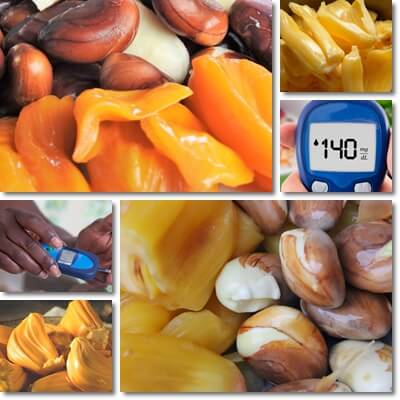Diabetes and jackfruit simply don’t make the best of pairs, despite the fruit being glorified as a cure for the condition. The reality is that jackfruit has a high carbohydrate content (23.25 g of carbs for every 100 g) and, on top of that, most of the carbohydrates in the ripe fruit are simple sugars (19.08 g of sugars). Very little of the total content is represented by dietary fiber (only 1.5 g per 100 g). Both the high content and the nature of the carbohydrates in ripe jackfruit cause it to raise blood sugar levels in diabetics. The side effects are more pronounced if intakes are excessive (large portions) or the fruit consumed too often.
What does jackfruit do for diabetes?
Eating jackfruit specifically for diabetes treatment is not a good idea. The fruit is not going to reverse or cure the condition by itself, despite claims of such effects. On the contrary, eating it in immoderate amounts or too frequently can result in high blood sugar and associated side effects in diabetics. This is especially true for the ripe fruit which is the one most often consumed worldwide (and high in carbs and sugars). This being said, a modest intake consisting of small portions consumed infrequently (at least not every day) can provide some benefits that positively affect diabetic health.

As a diabetic, it’s always worth remembering the nature of your condition: because of either insufficient insulin production or cells not responding properly to the insulin you are producing, the body struggles to efficiently remove sugar from the bloodstream so that it may be taken up by cells that need it. Long-term, high blood sugar levels cause tissue damage and diabetes-associated health problems ranging from loss of vision to nerve damage, ulcers that barely heal and cardiovascular problems. Naturally, the secret to managing the condition is controlling your carbohydrate intake so that you don’t overwhelm the body, but rather give it a chance at processing carbs properly, little by little. And eating jackfruit, a rather important source of carbohydrates, is clearly not a cure. Although it has its benefits.
When is jackfruit not good for diabetes?
Mainly when eaten in excessive amounts, either large portions at once or too frequently, such as every other day, every day or multiple times a day. The carbohydrate contribution from the fruit adds to one’s daily intake and, should it exceed a certain amount, side effects may ensue (diabetics are generally advised to eat no more than 45-60 g of carbohydrates per meal – intake considered for 3 main meals a day).
1) High carbohydrate and sugar content: 23.25 g of total carbohydrates per 100 g of ripe fruit, of which 19.08 g are sugars, another 2.67 g digestible carbohydrates that are not sugars but do contribute to blood sugar and 1.5 g indigestible dietary fiber that does not contribute to blood sugar levels.
2) Moderate glycemic index (GI) and glycemic load (GL) values. The glycemic index and glycemic load are scales that measure how fast a food or a given serving of a food raise blood sugar levels. Jackfruit glycemic index is 63, which is moderate while the glycemic load is about 15, which is moderate as well. This means that the fruit is likely to have pronounced effects on blood sugar, especially if eaten in excessive amounts or too frequently.

3) The riper the fruit, the more it raises blood sugar. This is because, as fruits ripen, the more complex carbohydrates that are also more difficult to digest break down into simpler forms, basically sugars, which are fairly easily digestible and raise blood sugar quicker as a result.
4) The ripe fruit doesn’t have much dietary fiber. Dietary fiber is plant material that passes undigested through the gastrointestinal tract. Its very nature makes digestion slower and also slows down the rate of sugar absorption into the bloodstream which benefits diabetes. But jackfruit has only 1.5 g of dietary fiber per 100 g which, compared to over 19 g of sugars (when ripe), doesn’t make that much of a difference. See Properties and Benefits of Dietary Fiber.
5) There are concerns of jackfruit diabetes medications interactions. Although just reports at this time, concerns have been raised regarding parts of the fruit interacting with diabetic medications, possibly potentiating their effects. Further investigation of the matter is required. Grapefruit and the juice made from it are also known to interact with various medications. Also read Can Diabetics Have Grapefruit Juice?
How is jackfruit good for diabetes?
1) Ripe jackfruit is good for preventing or reversing hypoglycemia or low blood sugar levels that some diabetic patients may experience (as a result of medication, having meals too far apart etc.).
2) One of the benefits of jackfruit for diabetes is its blood-pressure lowering properties stemming from a good potassium content (448 mg of potassium per 100 g or about 10% of the recommended daily intake, RDI, for an adult) and good magnesium content (29 mg of magnesium per 100 g or close to 10% of the RDI for an adult). The fruit is also extremely low in sodium (2 mg per 100 g, out of the 2300 mg allowed for an adult, or less than 0.2%).
3) Potential benefits for diabetes-related neuropathy (nerve damage) thanks to a good content of vitamin B6 (0.329 mg per 100 g or 25% of the recommended daily intake, RDI for an average adult). Jackfruit is also a good source of other B vitamins, notably B1 (0.105 mg or close to 10% RDI), B2, B3, B5 and B9 (roughly 5% of RDI or 0.055 mg vitamin B2, 0.92 mg vitamin B3, 0.235 mg vitamin B5, 24 micrograms vitamin B9).
4) Benefits for wound healing. Thanks to a good vitamin C content (13.8 mg per 100 g), trace amounts of vitamins A, E and zinc and other antioxidants with anti-inflammatory and antibacterial properties.
5) Possible use for weight loss. You’d think that jackfruit is not good for weight loss, given its high sugar content. However, substituting a cup of rice, a serving of white bread or similar high-glycemic food choices for a small serving of jackfruit can actually help you lose some weight. On the one hand, jackfruit has only 95 kcal per 100 g. By comparison, 100 g of typical white-flour bread has 230 to 330 kcal, 2 slices of bread have about 130 g, whereas one cup of cooked rice has over 200 kcal. Moreover, the fast-acting sugars in the fruit support an active lifestyle that is encouraging of weight loss whilst providing nutrition to the body.
How to eat jackfruit safely if you have diabetes
1) Small servings – start with small amounts to see how it affects your blood sugar.
2) Don’t have more than 1 serving a day. At the very least, it allows for variety in your diet which can translate into better nutrition and greatly benefit your health.
3) Enjoy it infrequently – not every day and maybe not every other day either.
4) Always best had after a meal, preferably one low in carbohydrates and higher in protein. This will help you achieve better blood sugar and insulin control.
5) Don’t pair with other fruits – sugars accumulate and your blood sugar will go up.
6) Swap the sweet, ripe fruit for a small serving of tender, unripe jackfruit – you get more fiber, less easily digestible sugars and possible enjoy better blood sugar control.
7) Given its moderate glycemic index and moderately high glycemic load values, it’s best paired with fairly low glycemic foods such as source of protein (nuts, seeds, cheese, eggs, lean chicken).
8) Plan ahead for when you want to eat jackfruit. Have it instead of a cup of rice, bread or other fruit.
9) It helps to exercise afterwards, especially if you’re having the ripe fruit. It’ll help you use up the carbohydrates and improve your blood sugar post-meal.
10) Always consider your individual response to foods, diabetic or not. If you don’t feel good after eating something or it makes you feel sick, don’t eat it anymore. There are scores of other foods with great nutritional capacity that might not elicit side effects, but offer the same health benefits, if not more.
Can you cure diabetes with jackfruit?
No, jackfruit is not a food that cures diabetes, as many claim. While consumption can be made safe for people with the condition and certain elements of the fruit’s nutrition may benefit diabetic health, the truth remains you can’t cure diabetes with jackfruit alone, whether it’s raw or cooked, ripe or unripe, whole or jackfruit flour or other products made from pulp. And until research proves otherwise, it’s best to keep counting your carbohydrate intake for the best possible management of the metabolic condition. Keeping active and adjusting your diet to suit your individual nutritional requirements and also lose weight or achieve a healthy weight are the tools to help you control your blood sugar, minimize long-term side effects and even reverse or cure type 2 diabetes.
